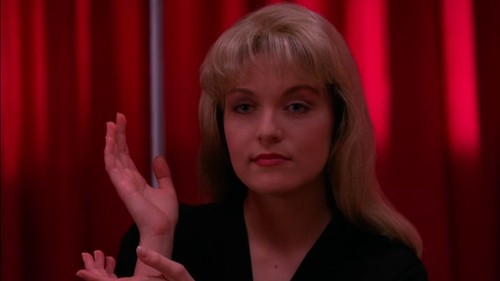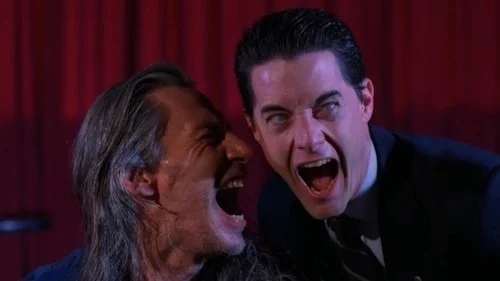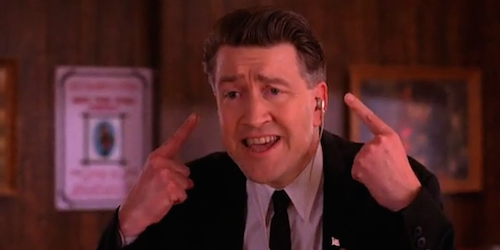Twin Peaks Week: Season Two
Season Two
Season two is the more controversial part of the Twin Peaks narrative. It is considerably longer (over twenty episodes, compared to season one's mere seven), definitely stranger (after the vicious finale before, where Special Agent Dale Cooper gets shot, we dip into the place between life and death), and full of major conflicts. ABC wanted the murderer of Laura Palmer to be revealed. David Lynch had never intended on showing the actual killer. It was meant to be a twist of an entire town being guilty, and an ambiguity that allowed you to draw your own conclusions. If the Black Lodge is never actually labeled as a specific place, why should the killer?
So Lynch and Mark Frost won and lost. Bob being the reason why evil exists is a nice emphasis on the complexities of the real world. Sometimes, malfeasance is just inexplicable. However, one poor sap was pegged for the death of Laura Palmer (and her coworker Ronette Pulaski): Leland Palmer, Laura's own father. His hair turned silver, and he appeared to be a new man after being an emotional wreck for all of season one. This was to be a new leaf. There sadly are no new leaves with Bob inside of you. As we learn throughout the latter parts of the series, Bob never leaves you once he gets a hold of you (see The Return for further evidence and rare exceptions).
For many people, the second season concluded once Leland was murdered by his own hand (or under Bob’s control). There was still many episodes left, in actuality. The new subplot of Windom Earle was finally coming (after a series of teases through chess pieces). A new diner girl was in town (played by Heather Graham). Things were going to escalate a little bit.
Leland Palmer, after recovering, rediscovering Bob’s power over him.
Depending on who you ask, they did and they didn't. The day-to-day stories began to slip into regular television territory (and not in the usual ironic way). Yet, at the same time, crazier stuff was happening. Josie Packard was forever trapped in a freaking wooden knob of all places, more visions were taking place, and a whole slew of oddball characters were now arriving (WHO CAN FORGET ABOUT GORDON COLE, ALBERT?). The show was becoming a familiarity within the television mold; the town of Twin Peaks was becoming overrun.
Lynch vowed to rebel against the system in his own little ways, but the perfect merge of typical-and-bizarre was distancing. Twin Peaks (a show that adored mirroring and dopplegängers) now had two entities of its own: the series that was meant for the fans, and the series that was built to upset the studio. For every curve ball Lynch tossed, the deeper into conventionalism we went. Some people claim the latter half of season two to be a blemish. I personally can now see the long game that was intended, since we've had additional chapters added since. However, within context, back when season two and Fire Walk With Me were all we had left, this latter half was almost an afterthought.
That is until the breathtaking then-series finale. Cooper gains access to the Black Lodge through his own doing (and not through his subconscious). The absolute nightmare begins. Like the ending of the pilot, and arguably the ending of season one (with Cooper being shot), the series ended with a gigantic question mark. The brilliance here is the insinuation that a series can always continue. The Sopranos took a similar route; how can this story truly end, when there isn't a true finality to it?
Dale Cooper and Bob converging.
Cooper meets Bob head on. A tulpa (clone) is created of Cooper to run amok on the earth. Cooper himself-- the master investigator-- is left to brood in purgatory for whoever knows how long. The Cooper we know in physical form is now run by Bob. There is one Cooper, two Coopers, yet three Coopers: all three answers are correct. Laura Palmer vows to revisit the Cooper trapped in the Black Lodge twenty five years later, but that isn't a guarantee that he will see the light of day. Evil Cooper is now in Twin Peaks, and ready to ask how Annie (Graham, now unconscious) is doing. That's how it ends: with a fractured mirror, a bleeding forehead, and a cackle.
The promise this ending showed had to have meant something, even for the naysayers. This is the thematic observation of the double we wanted. We finally can see literal doubles of a main character being created. There are actually three Coopers! The owls are almost like security cameras for Bob. The underworld seeping into reality (and vice versa) was getting stronger and stronger.
Evil Cooper arriving in Twin Peaks, and the final sequence of season two.
At the time, this was it, though. A film came out a few years later, but there was nothing else to look forward to. All we had was Laura's twenty-five-year promise. Were we locked in the Black Lodge? Is this timeless either our dependency on a television show to keep going?
Despite the forced conventionalities (thanks, ABC), season two showed promise at continuing the meta themes of the televised nuclear family. In the Black Lodge, guests sit in one spot and interact with each other within such a small space. Every room is sectioned off by red drapes. Every corridor looks the same. Every part of this underworld is a living room, decorated by seats and appliances fit for a television set to complete. We witness the Black Lodge in a near-identical way, yet we see it as a vastly different world. We are living in the Black Lodge, folks. We wait and wait and wait on these serials that may continue for ten years, or they can end tomorrow. We sit in our seats and stare blankly at the screen. For the twenty five years we were asked to wait, we were Cooper: sitting in one spot with hopes of a return. Once this mini series did arrive, the portal finally opened, and we could leave the Black Lodge.
Is it any coincidence that David Lynch plays a character that commands each scene as if he were a in-the-moment director or producer?
The world Lynch made was also accidentally prophetic. Even though laserdiscs existed, the advancement of home video consumption was lightning fast. Movies on DVD (or, then, VHS) made sense. Television did not. It was only once HBO wised up to the large amounts of illegal The Sopranos DVDs being shipped to Canada (HBO wasn't available there previously) that the show was put on disc for home viewers to purchase. Eventually came other shows, including Twin Peaks. Who could have foretold the ability to fester in both the town and the Black Lodge for eons to come?
Yet it all still makes sense: the ability to revisit the town and fall in love with the town all over again, the limbo of the Black Lodge, and all of these familiar faces being tossed up in the air, waiting to land. The internet boomed as well. We first had cult websites, then LiveJournal and Myspace, and now Tumblr and Facebook. The internet united fans that wanted to discuss inquiries, thoughts, nagging questions, and favourites. Many years later, these fascinations have turned into memes: never ending, cycling inside jokes. These include ways of mocking James Hurley, referencing the backwards talk of the Black Lodge, and all of the fine weirdness the show provided. The super-fans communicate these through familiarity. New comers find some sort of strange answer through these. Again, it's the fluent regularity versus the glaring unusual.
So much time has passed, and a hell of a lot has changed. Consumption has transformed, too. We have streaming, channel subscriptions and more. It's as if Laura's dream of us coming back twenty five years later was the ideal amount of time. There is no way Lynch and Frost could have foretold an entertainment market that was finally fit for them, and yet here we are. Season two is the finite end of the sanctions Twin Peaks had to abide by. But, before we get to the complete death of television through The Return, we have the other passageways into this town: a film, and a book. Like the Black Lodge, Twin Peaks was beginning to be accessible through many portals. For the ever-expanding fanbase, this was necessary.
Andreas Babiolakis has a Masters degree in Film and Photography Preservation and Collections management from Ryerson University, as well as a Bachelors degree in Cinema Studies from York University. His favourite times of year are the Criterion Collection flash sales and the annual Toronto International Film Festival.







